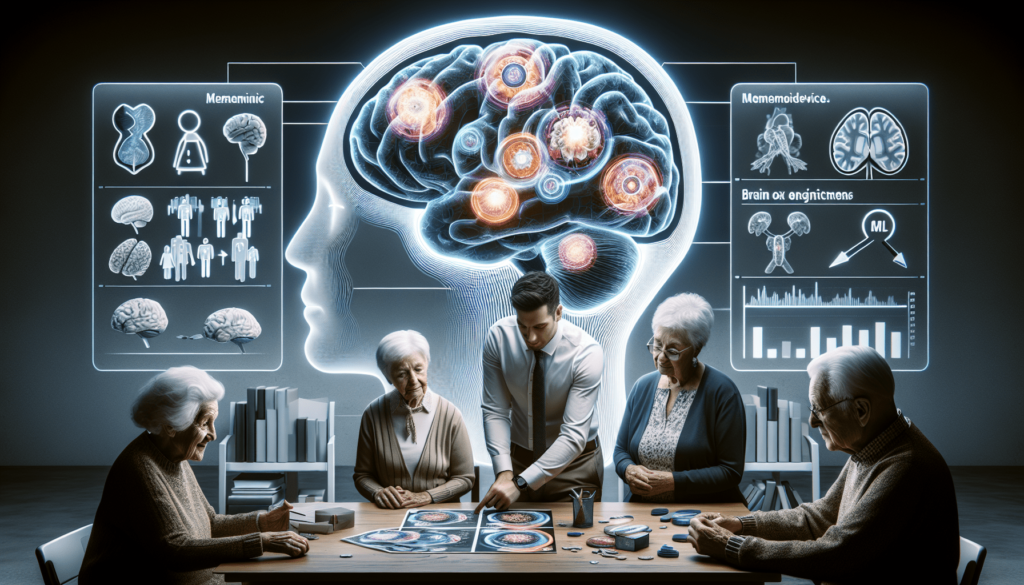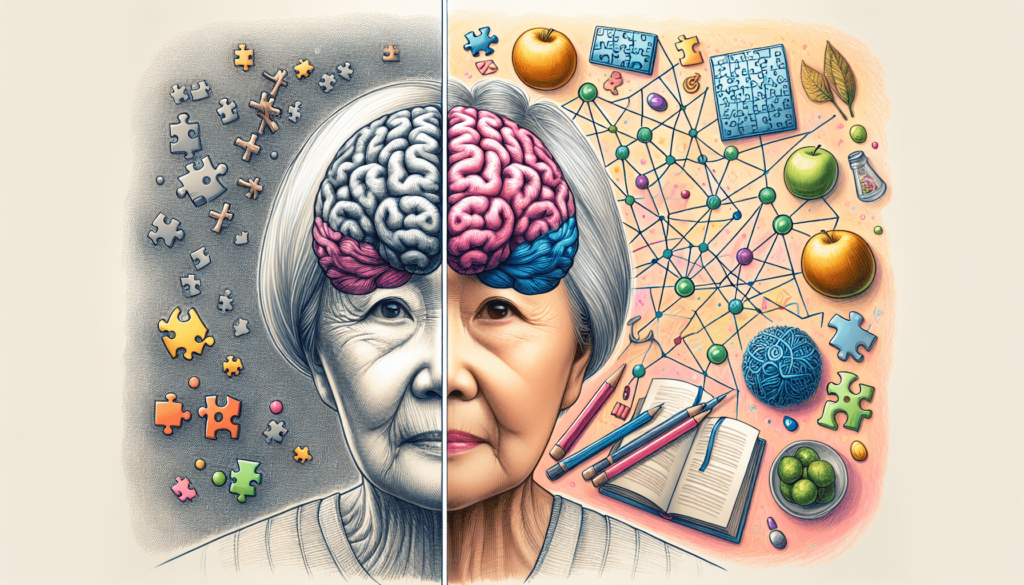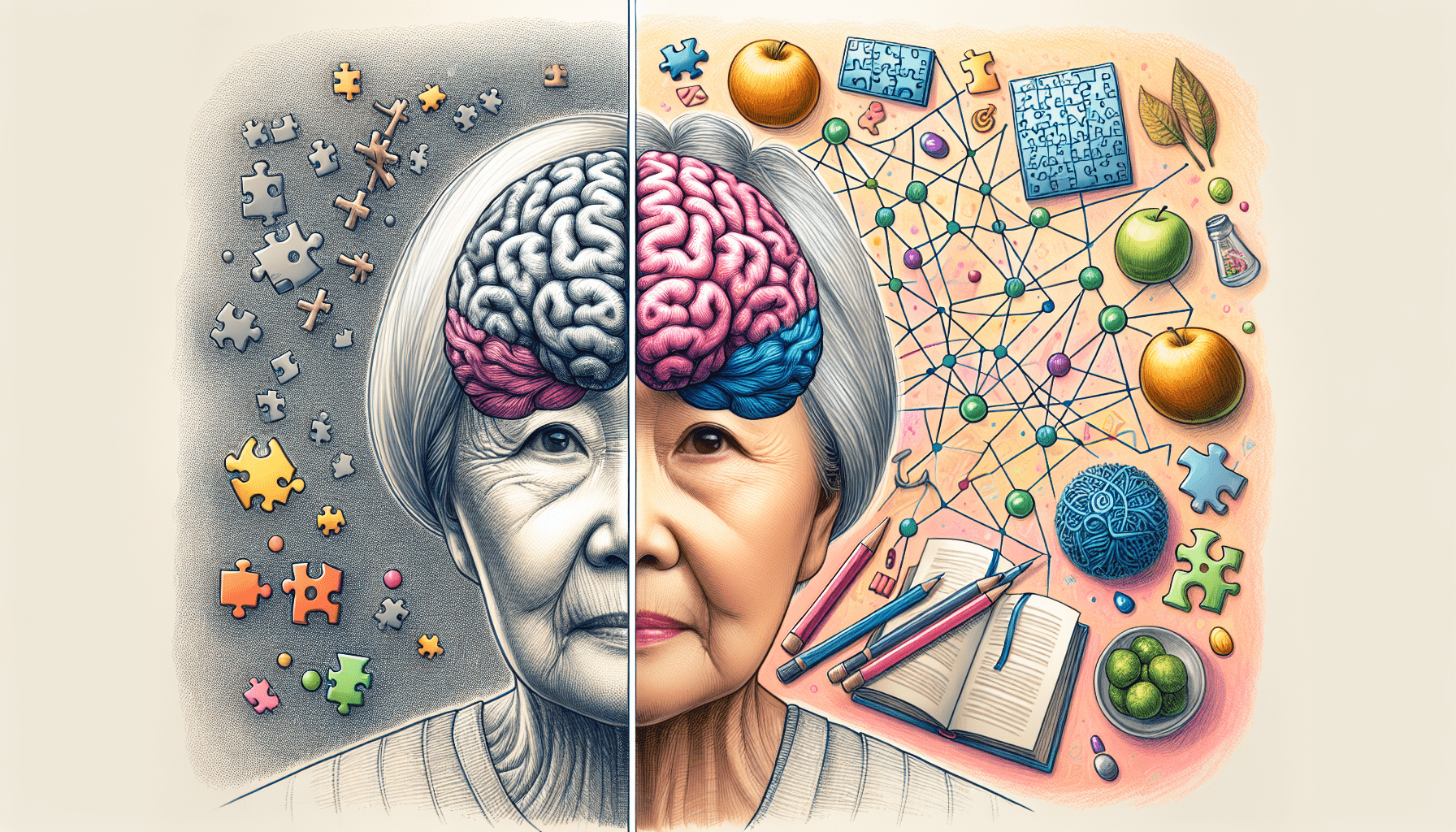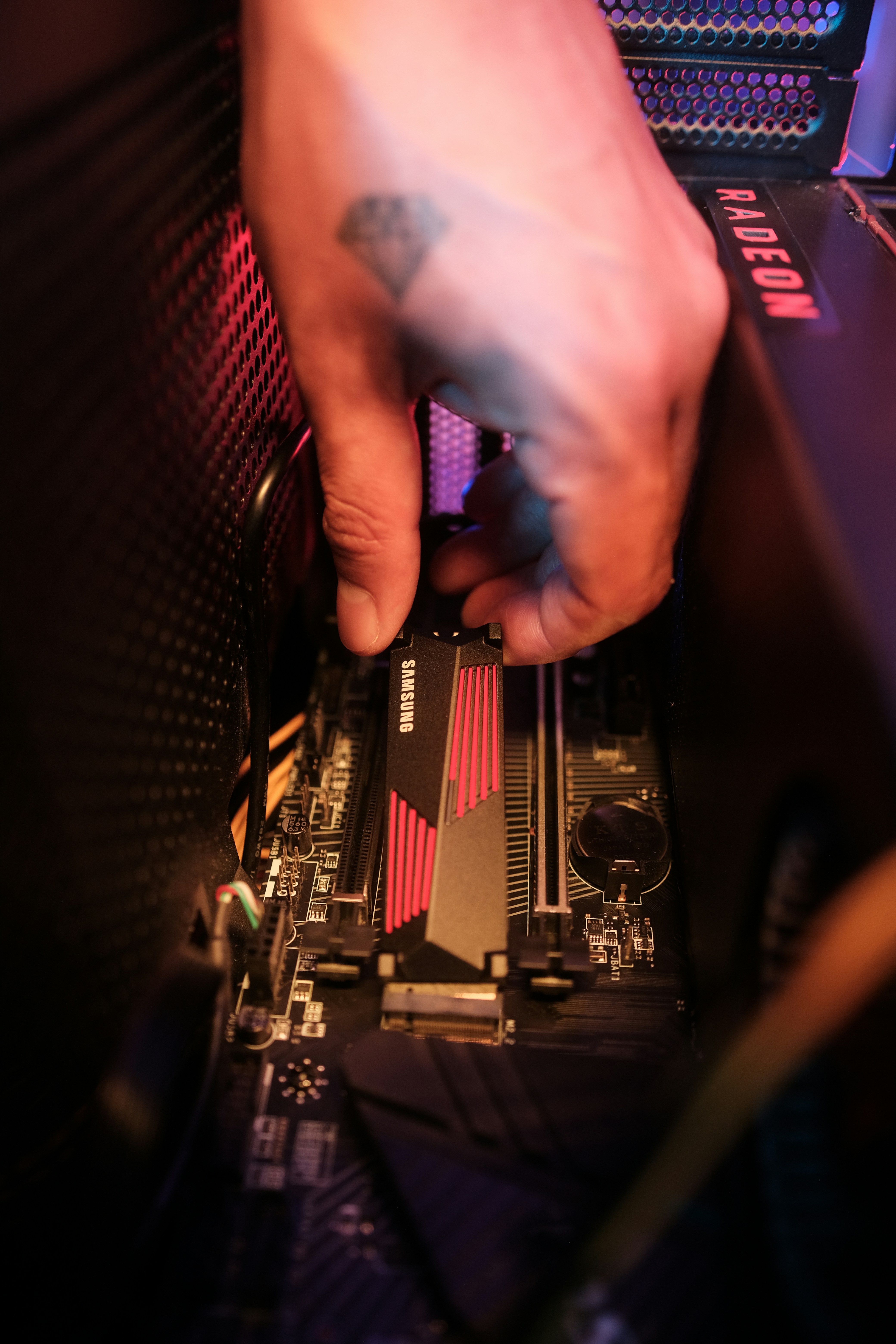Are you curious about the cognitive impairments that come with age-related memory loss? If so, you're in the right place. In this article, we will explore the specific cognitive problems that are often associated with this type of memory decline. By gaining a deeper understanding of these impairments, you will be better equipped to recognize and address them, both for yourself and for your loved ones. So, let's embark on this journey together and shed some light on the fascinating world of age-related memory loss and its cognitive challenges.
Understanding Memory Loss and Aging
As we age, it is common to experience some degree of memory loss. This article aims to provide a comprehensive understanding of age-related memory loss, including its definition, different types of memory affected, cognitive implications, detection and diagnosis, differentiation from dementia, causes and risk factors, effects on daily life, prevention and slowing down, treatment and management, as well as future perspectives on research and innovation.
Defining age-related memory loss
Age-related memory loss refers to the normal decline in memory function that occurs as we get older. It is a natural part of the aging process and is generally characterized by difficulties in remembering recent events, names, or other small details. While it is common to experience occasional memory lapses, such as forgetting where you placed your keys, age-related memory loss does not significantly impact daily functioning.
Distinguishing between normal and abnormal memory loss
It is important to differentiate between normal age-related memory loss and more serious forms of memory impairment, such as Alzheimer's disease or other types of dementia. Normal memory loss is generally mild in nature and does not progress rapidly. On the other hand, abnormal memory loss involves more severe and noticeable deficits in memory function that may interfere with daily life activities.

Overview of memory process and aging
To understand age-related memory loss, it is helpful to have an overview of the memory process and how it is affected by aging. Memory can be categorized into different types, such as short-term memory and long-term memory. Short-term memory refers to the ability to hold and manipulate information for a short period of time, while long-term memory involves the retention and recall of information over a longer duration.
Types of Memory Affected by Aging
Short-term memory and aging
Short-term memory is particularly vulnerable to the effects of aging. As we get older, it may become more difficult to retain and remember new information or events. This can manifest as forgetfulness about recent conversations, misplacing objects, or difficulty following and remembering new instructions.
Long-term memory and aging
While long-term memory is generally less affected by aging compared to short-term memory, some changes may still occur. Older adults may experience difficulties in recalling specific details or events from the past, although the broader context or general knowledge may remain intact. For example, an individual may struggle to remember the name of a childhood friend but can still recall the overall experience of their friendship.
Implicit and explicit memory in seniors
Implicit memory refers to unconscious memory processes that are not easily verbalized. This includes motor skills, habits, and conditioned responses. Implicit memory tends to be preserved in seniors, meaning that older adults can often learn new skills or engage in familiar activities without much difficulty.
Explicit memory, on the other hand, involves the conscious recollection of facts and events. This type of memory is more susceptible to age-related decline, leading to difficulties in remembering specific details or recalling recent events.
Semantic and episodic memory and aging
Semantic memory encompasses general knowledge and facts about the world, such as vocabulary, historical events, and concepts. This type of memory remains relatively stable in older adults.
Episodic memory, on the other hand, involves personal experiences and events. Older adults may experience challenges in retrieving specific details or contextual information about past events, although they may still have a general sense of the event occurring.
Cognitive Implications of Age-Related Memory Loss
Age-related memory loss can have various cognitive implications, including problems with concentration and attention, impact on language and communication, decline in critical thinking and problem-solving skills, as well as effects on spatial and temporal orientation.
Problems with concentration and attention
As age-related memory loss progresses, concentration and attention span may also be affected. Older adults may find it harder to focus on tasks, stay engaged, or avoid distractions. This can lead to difficulties in completing complex tasks or following conversations.
Impact on language and communication
Memory loss can have a significant impact on language and communication skills. Older adults may struggle to find the right words, experience word-finding difficulties, or have trouble following and contributing to conversations. This can result in social withdrawal or frustration due to communication challenges.
Decline in critical thinking and problem-solving skills
Age-related memory loss can also impact critical thinking and problem-solving abilities. Older adults may find it harder to analyze complex situations, make decisions, or come up with creative solutions. This can have implications for independent living, work performance, and overall quality of life.
Effect on spatial and temporal orientation
Spatial and temporal orientation may be affected by age-related memory loss. Older adults may experience difficulties in navigating familiar environments, finding their way, or remembering appointments and schedules. This can lead to increased reliance on external aids, such as calendars or navigation apps, to compensate for these challenges.
Detection and Diagnosis of Age-Related Memory Loss
Detecting and diagnosing age-related memory loss involves looking for signs and symptoms, utilizing diagnostic tools and tests, and understanding the physiological changes associated with cognitive impairment.
Signs and symptoms
Signs and symptoms of age-related memory loss may include forgetfulness, difficulty learning new information, misplacing objects, repetitive questions or statements, and a reliance on memory aids, such as notes or reminders. It is important to note that occasional memory lapses do not necessarily indicate age-related memory loss, but rather a pattern of significant memory decline.
Diagnostic tools and tests
To assess memory loss, healthcare professionals may utilize various tools and tests. These can include standardized memory tests, cognitive assessments, and neuroimaging techniques to evaluate brain structure and function. These evaluations help to differentiate between normal age-related memory loss and more severe forms of cognitive impairment.
Physiological changes associated with cognitive impairment
Age-related memory loss is associated with certain physiological changes in the brain. These include shrinkage of the hippocampus, a region critical for memory formation, as well as the accumulation of plaques and tangles, which are hallmark features of Alzheimer's disease. Understanding these underlying changes can aid in the detection and diagnosis of age-related memory loss.

Differentiating Age-Related Memory Loss from Dementia
It is important to differentiate age-related memory loss from dementia, as the latter involves more profound cognitive impairment and functional decline. By understanding key differences in symptoms, disease progression, impact on daily life, and differential diagnosis procedures, healthcare professionals can provide appropriate care and support.
Key differences in symptoms
Age-related memory loss generally involves mild forgetfulness and occasional memory lapses. Individuals can still carry out their daily activities independently and have a relatively intact overall cognitive function. In contrast, dementia is characterized by more severe memory loss, confusion, disorientation, and a progressive decline in cognitive abilities.
Disease progression and impact on daily life
Age-related memory loss tends to progress slowly and does not significantly impact daily functioning. In contrast, dementia is a progressive condition that worsens over time and eventually affects the individual's ability to carry out daily activities independently. Dementia may also lead to behavioral and psychological symptoms, such as agitation, aggression, and mood changes.
Differential diagnosis procedures
Differentiating age-related memory loss from dementia involves a comprehensive evaluation by healthcare professionals. This can include a thorough medical history, physical examination, cognitive assessments, and neuroimaging tests. By ruling out other potential causes of cognitive impairment, such as medication side effects or medical conditions, an accurate diagnosis can be made.
Causes and Risk Factors for Age-Related Memory Loss
Age-related memory loss can have various causes and risk factors, including genetics and family history, lifestyle factors, medical conditions, as well as trauma and stress.
Genetics and family history
There is evidence to suggest that genetics plays a role in age-related memory loss. Having a family history of memory problems or dementia may increase the likelihood of experiencing memory loss as you age. However, it is important to note that genetics is just one factor and does not guarantee the development of age-related memory loss.
Influence of lifestyle factors
Lifestyle factors can significantly impact age-related memory loss. Poor nutrition, lack of physical exercise, excessive alcohol consumption, smoking, and chronic sleep disturbances can all contribute to cognitive decline. Adopting a healthy lifestyle, including a balanced diet, regular exercise, and adequate sleep, can help preserve memory function.
Impact of medical conditions
Certain medical conditions can also contribute to age-related memory loss. These include cardiovascular disease, diabetes, hypertension, and chronic kidney disease. These conditions can affect blood flow to the brain or lead to chronic inflammation, which can accelerate cognitive decline.
Effects of trauma and stress
Traumatic brain injury, such as a concussion or head trauma, can increase the risk of age-related memory loss. Additionally, chronic stress, such as ongoing financial or emotional stress, can impact cognitive function over time. Managing stress and seeking appropriate treatment for traumatic brain injuries can help minimize the risk of memory impairment.

Effects of Age-Related Memory Loss on Daily Life
Age-related memory loss can have significant effects on daily life, including impacts on independence and self-care, relationships and social interactions, job performance and productivity, as well as mood changes and mental health.
Impact on independence and self-care
Memory loss can interfere with daily activities, such as managing personal finances, maintaining medication schedules, or remembering important appointments. This can lead to increased reliance on external aids or the support of caregivers, potentially impacting overall independence and self-care.
Effect on relationships and social interactions
Memory loss can strain relationships and impact social interactions. Forgetfulness or repetitive questioning can frustrate loved ones, while communication difficulties may lead to social withdrawal or isolation. Maintaining open communication and seeking support from friends and family can help navigate these challenges.
Influence on job performance and productivity
For individuals still in the workforce, age-related memory loss can affect job performance and productivity. Difficulties in remembering instructions, meeting deadlines, or recalling important information can lead to decreased efficiency or errors. Utilizing memory aids, implementing organizational strategies, or seeking reasonable workplace accommodations can help mitigate these effects.
Role in mood changes and mental health
Memory loss can also have an impact on mood and mental health. Frustration, irritability, or feelings of embarrassment or inadequacy may arise from memory difficulties. It is important to prioritize mental well-being and seek support or counseling if necessary to address any negative emotions associated with age-related memory loss.
Preventing and Slowing Down Age-Related Memory Loss
While age-related memory loss is a normal part of the aging process, there are strategies and lifestyle modifications that can help prevent or slow down cognitive decline.
Lifestyle modifications and strategies
Adopting a healthy lifestyle can promote brain health and preserve memory function. This includes engaging in regular physical exercise, maintaining a balanced diet rich in fruits, vegetables, and whole grains, managing stress levels, getting adequate sleep, and avoiding excessive alcohol consumption and smoking.
Role of physical activity and healthy eating
Physical activity has been shown to have a positive impact on cognitive function. Regular exercise, such as aerobic activities or strength training, can improve blood flow to the brain and promote the growth of new neurons. Similarly, a nutritious diet, including foods rich in antioxidants, Omega-3 fatty acids, and vitamins, can support brain health and reduce the risk of age-related memory loss.
Importance of mental stimulation and lifelong learning
Engaging in mentally stimulating activities can help preserve memory function. Reading, puzzles, learning new skills, or participating in intellectually challenging activities, such as playing a musical instrument or learning a new language, can provide cognitive stimulation and promote brain health.
Use of technology aids
Technology can also play a role in supporting memory function. Memory aids, such as smartphone apps or digital calendars, can help with daily reminders and task management. Similarly, brain training apps or games designed to improve memory and cognitive abilities are available for individuals to use at their convenience.

Treatment and Management of Age-Related Memory Loss
While there is no cure for age-related memory loss, various treatment and management approaches can help individuals cope with memory difficulties and preserve overall cognitive function.
Medication options
There are medications available that can temporarily improve memory or slow down cognitive decline in some individuals. These medications, such as cholinesterase inhibitors, may be prescribed by healthcare professionals after a comprehensive evaluation and diagnosis. However, it is important to note that the efficacy of these medications may vary among individuals.
Role of cognitive therapy and rehabilitation
Cognitive therapy and rehabilitation can help individuals develop strategies to compensate for memory difficulties. This can involve memory training exercises, organization techniques, and learning new memory strategies. Cognitive therapists can also provide support and guidance in managing the emotional impact of memory loss.
Involvement of support groups and counseling
Support groups or counseling can be beneficial in helping individuals with age-related memory loss cope with the challenges they face. Sharing experiences, obtaining practical advice, and receiving emotional support from others in similar situations can help alleviate feelings of isolation and foster a sense of community.
Integration of technology in cognitive health management
Technology can be integrated into the management of age-related memory loss. Virtual reality therapy, for example, is a promising approach that utilizes immersive experiences to stimulate memory and cognition. Monitoring systems or assistive devices can also help individuals manage medication schedules or provide reminders for daily activities.
Future Perspectives: Research and Innovation in Addressing Age-Related Memory Loss
Research and innovation continue to advance in the field of age-related memory loss. New developments, emerging drugs and therapies, the impact of artificial intelligence and machine learning, as well as the potential of genetic engineering offer exciting possibilities for tackling age-related memory loss.
Latest developments in memory research
Ongoing research efforts are focused on understanding the underlying mechanisms of age-related memory loss and identifying potential targets for intervention. This includes studying the role of neuroplasticity, inflammation, and various neurotransmitter systems in memory formation and retention.
Emerging drugs and therapies
Scientists are exploring novel drugs and therapies that may slow down or delay age-related memory loss. These include medications targeting specific proteins or pathways involved in memory impairment, as well as innovative gene therapy approaches that aim to restore or enhance memory function.
Impact of artificial intelligence and machine learning
Artificial intelligence and machine learning algorithms are being harnessed to analyze vast amounts of data and identify patterns that may predict or detect age-related memory loss at an earlier stage. These technological advancements have the potential to revolutionize the field of cognitive health and lead to more accurate and personalized interventions.
Potential of genetic engineering in treating age-related memory loss
Advances in genetic engineering hold promise in treating age-related memory loss. Researchers are exploring gene-editing techniques, such as CRISPR, to modify specific genes associated with memory impairment. While these approaches are still in the early stages of development, they offer exciting possibilities for targeted interventions in the future.
In conclusion, age-related memory loss is a normal part of the aging process. While some degree of memory decline is expected as we get older, it is important to distinguish between normal memory loss and more serious forms of cognitive impairment, such as dementia. Various factors, including genetics, lifestyle, medical conditions, and stress, can contribute to age-related memory loss. Its effects on daily life can be significant, but lifestyle modifications, cognitive therapy, and support networks can help individuals cope with memory difficulties. Ongoing research and innovation offer hope for new treatments and interventions that may further improve our understanding and management of age-related memory loss in the future.


